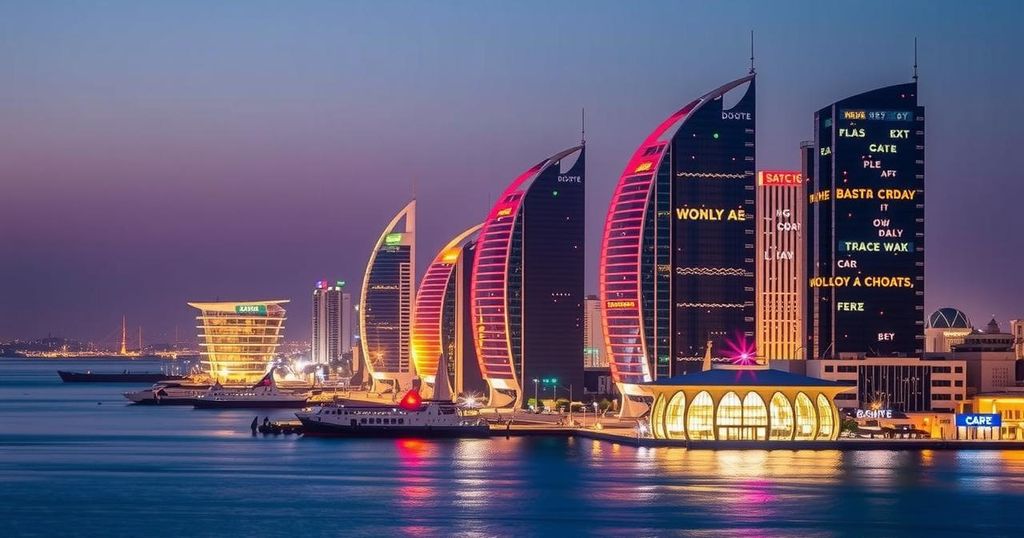The Iranian-backed axis is experiencing significant challenges with Hezbollah’s losses and the collapse of Assad’s regime, providing Qatar an opportunity to enhance its influence. Despite Israel’s satisfaction with Iran’s setbacks, Hamas’s control over Gaza presents ongoing threats. Qatar’s strategic diplomacy at the Doha Forum showcases its strengthened position in a shifting political environment in the Middle East.
The Iranian-backed coalition in the Middle East is currently facing critical setbacks, exemplified by the significant losses suffered by Hezbollah during a recent Israeli military operation that concluded on November 27. Additionally, the Assad regime’s collapse on December 8 represents a considerable blow to Iran’s logistical capacity, particularly its ability to supply weapons to Hezbollah, thereby leaving Iran in a precarious position. Notably, while Iran endures these losses, Qatar appears to be strategically positioned to capitalize on the situation.
Qatar’s involvement in the region has been underscored by its hosting of Hamas during the recent conflict that escalated on October 7, resulting in heinous attacks against Israel. Israel may be encouraged by the weakening of Iran’s influence, yet it must recognize the ongoing challenges posed by Hamas, which maintains control over central Gaza and has taken numerous hostages. The support extended to Hamas by both Qatar and Turkey further complicates the geopolitical landscape, evidenced by Qatar’s prominent role at the recent Doha Forum, which attracted various regional diplomatic figures.
During this forum, influential representatives from Iraq, Turkey, Egypt, Jordan, and major powers such as Iran, Russia, and Turkey gathered to deliberate on regional issues, including the future of Syria amidst the Assad regime’s disintegration. This gathering signifies a potential realignment in regional international relations, as entities previously aligned with Assad now display a willingness to engage cooperatively with Qatar and other stakeholders, highlighting the evolving political dynamics.
Qatar is poised to gain from Iran’s diminished strength, particularly concerning its influence over Hamas and the potential new leadership that may emerge in Syria. Historically, while Iran has primarily allied itself with non-Sunni groups, Qatar’s support for the Sunni Muslim Brotherhood distinguishes it from Iran’s strategies. This divergence has allowed Qatar to navigate conflicts in places such as Libya and Syria more effectively.
Despite past setbacks, including isolation following the Brotherhood’s ousting in Egypt in 2013, Qatar’s alliance with Turkey has solidified a robust partnership. Together, these nations have maintained outreach to Iran while aligning on mutual interests, particularly concerning Hamas. However, while Israel may perceive Iran’s diminished position as a success, it must remain vigilant as Hamas continues to be a significant adversary, controlling Gaza and pursuing influence in the West Bank.
The intricate geopolitical chessboard of the Middle East continues to evolve, especially as emerging threats could replace the waning Iranian influence. Israel must now contend with the implications of Qatar’s growing prominence and Hamas’s historical legacy of violence, which has proven profoundly destructive, marked by unprecedented attacks against civilians. The end of the Assad regime does not signal an outright resolution to Israel’s challenges; rather, it necessitates a keen understanding of the complexities surrounding Iranian-backed entities such as Hamas and their supporters, which remain vital to the region’s dynamics.
The topic of the article revolves around the shifting influence of regional players in the Middle East as the Iranian-backed axis faces significant challenges. In particular, the Hezbollah group’s substantial losses during a recent conflict and the collapse of the Assad regime in Syria have resulted in a change in the balance of power. Qatar’s growing influence and strategic role occasion serious discussions about the future political landscape of the region, especially in the wake of Hamas’s actions and its ongoing association with various state actors.
In summary, the current geopolitical landscape in the Middle East is marked by the weakening of Iran’s influence due to the recent upheavals in the region. Qatar is positioned to enhance its power and leverage over groups like Hamas while regional dynamics continue to evolve with the potential for new alignments coming into play. Vigilance is required as the ramifications of these changes unfold, particularly regarding Israel’s ongoing challenges against non-state actors such as Hamas who maintain significant control and pose substantial operational threats.
Original Source: www.jpost.com







